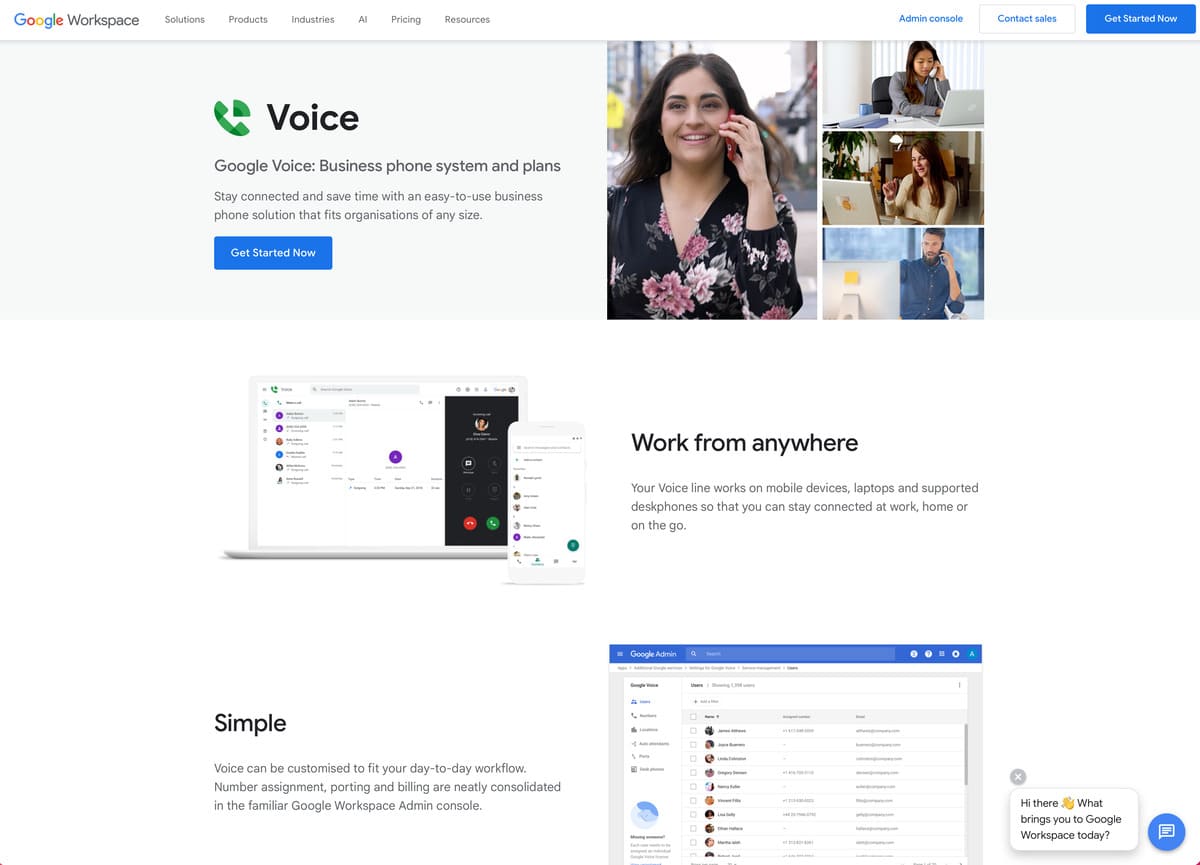For UK businesses, the adoption of cloud-based telephony solutions is increasingly becoming a key strategy for maintaining seamless communication, both internally and with customers. Google Voice, a product under the Google Workspace umbrella, offers a compelling solution that integrates smoothly with other Google services. But how does it stack up in terms of pricing and features? This guide offers a comprehensive review of Google Voice’s pricing structure and its relevance to UK businesses.
Overview of Google Voice for business
Google Voice is a cloud-based telephony service that allows businesses to make and receive calls from anywhere, using a variety of devices. It supports features like voicemail transcription, call forwarding, and spam filtering, while also integrating seamlessly with Google Workspace apps such as Gmail, Google Calendar, and Google Meet.
For businesses looking for a telephony solution that’s both flexible and scalable, Google Voice is an attractive option. It is particularly well-suited for organisations already invested in the Google ecosystem, as it can significantly streamline operations by centralising communication tools.

Google Voice business pricing list
| Plan | Cost per user/month | Key Features |
|---|---|---|
| Google Voice Starter | £8 | – Up to 10 users – Domestic and international calling – Google Workspace integration – Call forwarding to any device – Voicemail transcription |
| Google Voice Standard | £13 | – Unlimited users – All Starter plan features – Multi-level auto attendant – Ring groups – E911 support (US only) |
| Google Voice Premier | £20 | – All Standard plan features – Advanced reporting – Automatic call recording – Integration with BigQuery – International locations |
Pricing tiers for Google Voice
Google Voice offers three main pricing tiers for business users, each catering to different needs and organisation sizes. It’s important to understand the features available at each level to determine which plan best suits your business.
1. Google Voice Starter
- Cost: £8 per user per month
- Key features:
- Up to 10 users
- Domestic and international calling
- Google Workspace integration
- Call forwarding to any device
- Voicemail transcription
The Starter plan is ideal for small businesses or start-ups with a limited number of users. It provides essential telephony features at an affordable price, making it an excellent entry point for businesses new to cloud-based telephony.
2. Google Voice Standard
- Cost: £13 per user per month
- Key features:
- Unlimited users
- All features of the Starter plan
- Multi-level auto attendant
- Ring groups
- E911 support for emergency calling (US only)
The Standard plan is designed for growing businesses that require more advanced telephony features and have a larger number of users. The inclusion of multi-level auto attendant and ring groups helps businesses manage high call volumes more effectively, ensuring that calls are routed to the appropriate department or individual.
3. Google Voice Premier
- Cost: £20 per user per month
- Key features:
- All features of the Standard plan
- Advanced reporting
- Automatic call recording
- Integration with BigQuery
- International locations
The Premier plan is tailored for larger enterprises or businesses with complex telephony needs. The advanced reporting and automatic call recording features provide valuable insights and compliance capabilities, while integration with BigQuery allows for detailed data analysis. The ability to support international locations makes this plan particularly appealing to global businesses.
Comparing Google Voice to competitors
While Google Voice offers a robust set of features at competitive prices, it’s essential to consider how it compares to other telephony solutions in the market. For instance, services like Microsoft Teams, Zoom Phone, and RingCentral offer similar functionalities, often with their own unique advantages.
- Microsoft Teams Calling: Integrated with the Microsoft 365 ecosystem, Teams Calling offers a deeply integrated experience for businesses already using Microsoft products. However, its pricing can be higher, especially when considering the need for additional Microsoft 365 licenses.
- Zoom Phone: Known for its ease of use and comprehensive feature set, Zoom Phone offers competitive pricing but may lack the deep integration with other business tools that Google Voice provides.
- RingCentral: A well-established player in the VoIP space, RingCentral offers extensive features and third-party integrations. However, its complexity and higher price point may not be necessary for smaller businesses.
Is Google Voice right for your business?
Choosing the right telephony solution depends on several factors, including the size of your business, existing software infrastructure, and specific communication needs. Google Voice’s competitive pricing, combined with its seamless integration with Google Workspace, makes it a strong contender for businesses already invested in Google’s ecosystem.
For small to medium-sized businesses, the Starter or Standard plans offer great value, providing essential features without unnecessary complexity. Larger enterprises with more demanding needs may find the Premier plan’s advanced features and global support indispensable.
Conclusion – Google Voice pricing review
Google Voice offers a flexible and cost-effective telephony solution for UK businesses, particularly those already using Google Workspace.
Its tiered pricing structure ensures that businesses of all sizes can find a plan that fits their needs and budget.
While there are other viable options in the market, Google Voice’s ease of use, integration capabilities, and straightforward pricing make it a worthy consideration for any business looking to enhance its communication infrastructure.
When comparing business VoIP providers, consider conducting a trial period with Google Voice to see how well it integrates with your existing tools and meets your specific communication requirements.
For more, visit the Google Voice website, and see our guide to the best business phone systems.
Google Voice pricing FAQ
Google Voice offers three pricing tiers for businesses: the Starter plan costs £8 per user per month, the Standard plan costs £13 per user per month, and the Premier plan is priced at £20 per user per month.
The Google Voice Starter plan supports up to 10 users, making it suitable for small businesses or start-ups with a limited number of employees.
Yes, the Google Voice Standard plan allows for unlimited users, providing flexibility for growing businesses without any user cap.
The Google Voice Premier plan includes advanced features such as automatic call recording, advanced reporting, and integration with BigQuery. Additionally, it supports international locations, making it ideal for global businesses.
The pricing for Google Voice is consistent across regions, with UK businesses paying £8, £13, and £20 per user per month for the Starter, Standard, and Premier plans, respectively.
Yes, you can upgrade from the Google Voice Starter plan to the Standard or Premier plans as your business grows. The cost will change accordingly to £13 or £20 per user per month, depending on the plan selected.
Google Voice includes domestic and international calling in all its plans. The cost of these calls is included in the monthly fee of £8, £13, or £20 per user, depending on your chosen plan.
The primary difference in Google Voice pricing between the Starter and Standard plans is £5 per user per month, with the Standard plan costing £13 per user compared to £8 per user for the Starter plan. The Standard plan also offers additional features like unlimited users and multi-level auto attendants.
As of now, Google Voice pricing is typically charged on a monthly basis per user, with no specific discounts mentioned for annual subscriptions at £8, £13, or £20 per user per month.
Google Voice is competitively priced, with costs of £8, £13, and £20 per user per month across its plans. This pricing is generally lower or on par with similar services like Microsoft Teams Calling and Zoom Phone, which may have higher costs depending on features and integration requirements.

